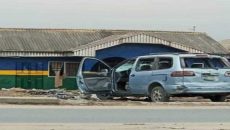 A Cross Section Of Tricycles as a Means Of Transportation
A Cross Section Of Tricycles as a Means Of Transportation
Among Nigeria’s 36 states, Delta operates arguably, Nigeria’s best transport system. A trip within the state will reveal this, as state-branded vehicles are a common sight in towns and communities across the state plying routes and offering transport services to people. But it is not just about availability, it is the fact that the fares are affordable. The Emmanuel Uduaghan administration had long subsidised transport fares in the state for the benefit of residents. The government purchases a fleet of vehicles, and gives them out at highly subsidized rates to private companies to run after which they pay a certain amount of money monthly to government. Because the vehicles belong to government, it determines the transport fare.
Benson Igbakpa, Commissioner for Transport, Delta State, explains how the formula works.
“The government owns the equipment, buses and boats. The private companies run them and pay stipend back to government on monthly basis. And, in line with that, no transporter has the right to raise transport fares. We control the fare because the equipment belongs to us. You didn’t buy it. From day one, you are making profit so the government regulates the price. If people are not coming to patronize you there’s no way you can raise the price. So what we have done is to crash the price of transportation in Delta State by fixing the price,” he said, adding that “Delta State parades the cheapest transport fare,” irrespective of the fact that people have to travel in style and comport. “You pay very small because the government subsidizes whatever you are paying. You pay a part of it and at the end of the month the government brings the other part and pays the operators.”
Emenike Okolie, an indigene of Asaba, attests to Delta State Government’s efforts to provide cheap transport services to its citizens. “What is true is that the fares charged by the state vehicles are cheaper than those operated by private operators across the state. I know because I patronise both buses,” he said. Apart from buses, the Delta State government also introduced a scheme, which enabled motorcycle owners to acquire tricycles in major towns like Asaba, as a way of restoring sanity to the roads and checking rising crime. Many motorcycle operators who hitherto flayed that decision have benefited from the initiative as they now own tricycles and, according to many who spoke to the magazine in Asaba, have been recording higher profit from work unlike before. To further improve transport system in the state, the Uduaghan administration is introducing a BRT and mega bus terminal system in major towns like Warri and Asaba. That of Warri, which will cover a 15.5 kilometres range, will have seventy buses servicing the BRT route and there will be a five-minute interval between buses. Meaning that passengers won’t have to waste a lot of time waiting to board the BRT buses each time.
In air transport the Uduaghan administration would be remembered also for the Asaba International Airport, which it built. Since 2011 that commercial flights commenced at the airport, it has gradually become a favourite of many air travelers within and outside Delta State due to its first class facilities. The riverine communities in the state are also not left out as the State government according to Igbakpa also procured new “150 water buses, 100 high capacity 22-seater and 30 eight-seaters,” and constructed new jetties to aid transportation in the creeks. One of such jetties was built in Koko and today stands as a showpiece of modern water transportation in the state. Says Igbakpa. “For our boats we have about 30 jetties because you cannot bring world class boats and run on rickety community jetties, so we built concrete jetties, about 30 of them, with Koko as the star jetty. The jetty in Koko is a marvel; it’s like an airport. You have seats there where you can wait for the boat before it comes, one shade on this side, another on the other side. It’s a twin waiting shade jetty.”
Beyond the provision of new vehicles, boats and jetties, the state government is also working towards restructuring Delta Line, the state-owned transport company, for better service delivery. As the state’s flagship transport company, Igbakpa told the magazine that the company’s scorecard had not been impressive in recent times as the management has been found wanting in accountability which created room for poor maintenance and breakdown of vehicles and all manner of shady deals in the company. The way out of the malaise, he said, is to overhaul the system, and this, the administration is focused on doing, in order to ensure that no arm of the transport sector is left behind in the government’s agenda to deliver world-class transport system to all parts of the state.
Follow Us on Social Media




 WhatsApp us
WhatsApp us